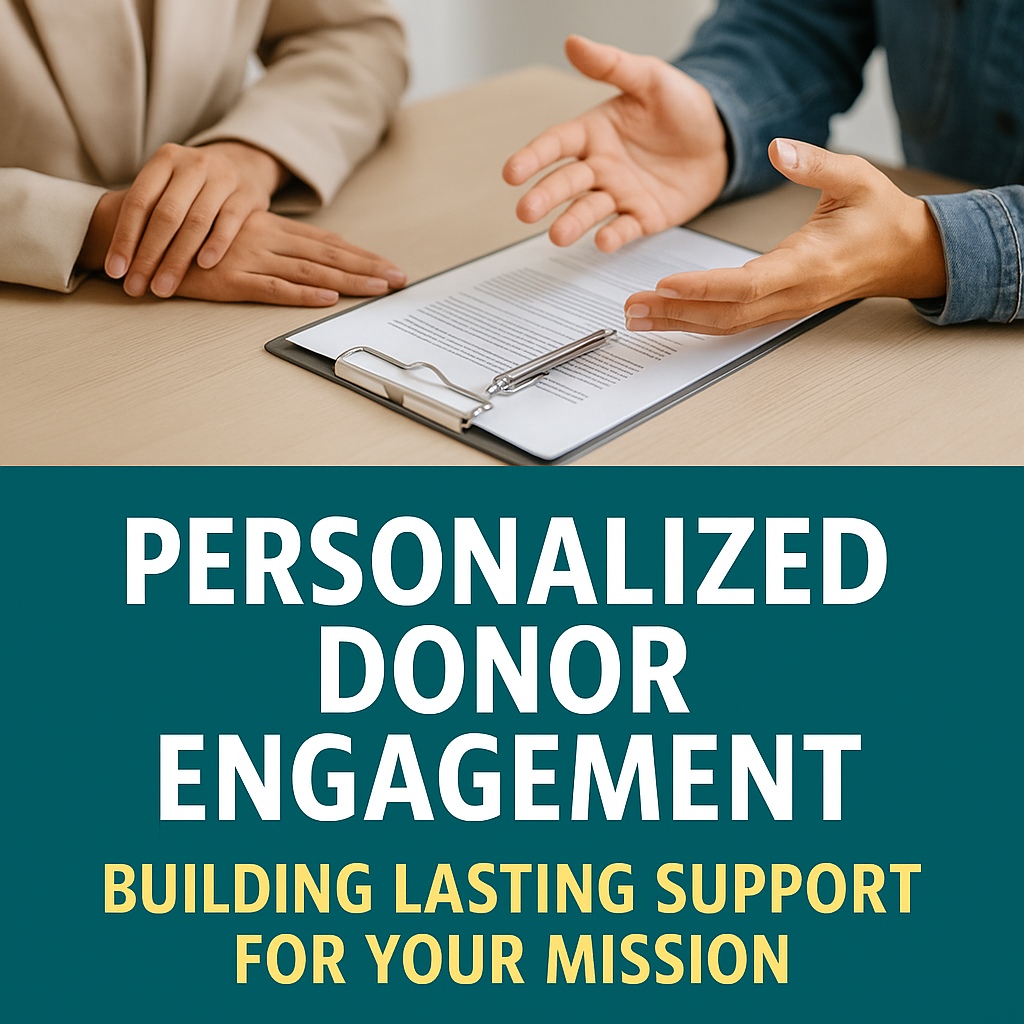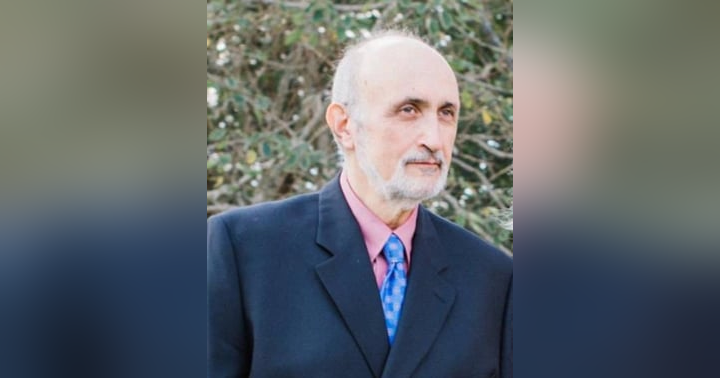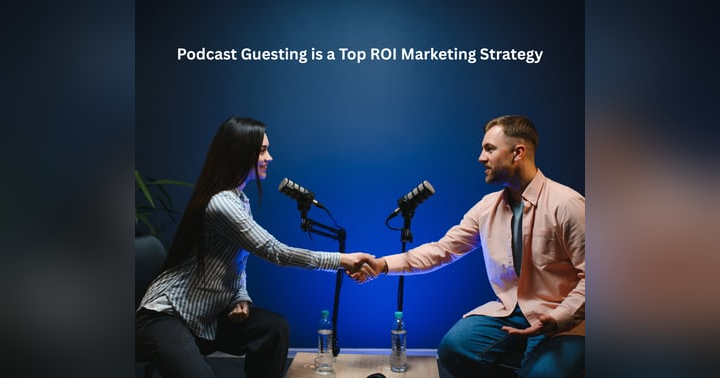
In today's world, where attention spans are fleeting and causes are abundant, building lasting relationships with donors is more critical than ever for nonprofits. It's no longer enough to simply ask for money; you need to connect with donors on a personal level, demonstrating that you understand their values and appreciate their contribution. This blog post delves into the art and science of personalized donor engagement, offering practical strategies for cultivating meaningful connections and fostering long-term support for your mission.
This topic was recently discussed on the Conversations with Rich Bennett podcast in an episode titled "Fundraising Mistakes Nonprofits Keep Making (And How to Fix Them)." The episode touched on the necessity of personalized engagement as a countermeasure to common fundraising pitfalls. This blog post expands on that discussion, providing a deeper dive into how to implement personalized strategies effectively. We'll explore how understanding your donors, leveraging technology, and building strong community relationships are essential components of a successful fundraising approach. Whether you're a seasoned nonprofit professional or just starting out, this post will provide actionable insights to help you build stronger, more meaningful relationships with your donors and secure the resources you need to achieve your mission.
The Heart of Fundraising
Fundraising is often viewed as a purely transactional activity – a necessary means to an end. However, at its core, fundraising is about building relationships. It's about connecting people who care about a cause with the resources needed to make a difference. It's about creating a community of supporters who feel valued, appreciated, and invested in your organization's success. This is particularly true in the current philanthropic climate, where donors are increasingly seeking deeper engagement and a tangible connection to the impact of their giving.
Think of fundraising not as asking for money, but as offering an opportunity – an opportunity for individuals to align their values with a cause they believe in, to make a real difference in the world, and to be part of something bigger than themselves. When you frame fundraising in this light, it becomes less about the transaction and more about the relationship, opening the door for personalized engagement.
Why Personalization Matters in Donor Engagement
In an age of mass communication, personalization stands out as a powerful tool for building meaningful connections. Donors are bombarded with generic appeals daily, making it difficult for any single message to resonate. Personalization cuts through the noise by demonstrating that you see donors as individuals, not just wallets. It shows that you value their unique interests, motivations, and past contributions.
Personalized engagement can take many forms, from addressing donors by name in communications to tailoring your appeals to their specific interests. It can also involve acknowledging their giving history, recognizing milestones in their relationship with your organization, and offering them opportunities to engage in ways that align with their preferences. The key is to make each interaction feel personal, relevant, and meaningful.
The benefits of personalized donor engagement are significant. It can lead to increased donor retention, higher average gift sizes, and stronger donor loyalty. It can also transform casual donors into passionate advocates, who are more likely to spread the word about your organization and encourage others to support your cause.
Understanding Your Donors: More Than Just a Name
Personalization starts with understanding your donors. This means going beyond basic demographic data and delving into their motivations, interests, and values. What inspires them to give? What are their passions? What kind of impact do they want to make in the world? The more you know about your donors, the better equipped you'll be to connect with them on a personal level.
There are several ways to gather this information. Start by reviewing your donor database and looking for patterns in giving behavior. Which programs do your donors tend to support? What are their average gift sizes? How frequently do they give? You can also use surveys, questionnaires, and online polls to gather more in-depth information about your donors' interests and preferences. Consider segmenting your donor base based on shared characteristics or interests to tailor your communications and engagement strategies more effectively.
Another invaluable resource is direct communication. Pick up the phone and call your donors. Invite them to attend events and ask for their feedback. Send personalized thank-you notes and share stories of impact. The more you interact with your donors, the better you'll understand their motivations and the more meaningful your engagement will be.
Strategies for Personalized Donor Interactions
Once you have a solid understanding of your donors, you can begin to implement personalized engagement strategies. Here are a few ideas to get you started:
- Personalized Communications: Address donors by name in all communications. Tailor your appeals to their specific interests and giving history. Share stories of impact that resonate with their values.
- Targeted Events: Host events that cater to specific donor segments. Offer exclusive opportunities for major donors or long-time supporters. Create events that align with your donors' interests, such as a behind-the-scenes tour of your facilities or a volunteer opportunity.
- Personalized Thank-You Notes: Send handwritten thank-you notes to all donors, expressing your gratitude for their support. Acknowledge the specific impact of their gift and share a personal anecdote about how their contribution is making a difference.
- Birthday and Anniversary Cards: Celebrate your donors' birthdays and anniversaries with personalized cards or emails. This small gesture shows that you care about them as individuals and value their relationship with your organization.
- Exclusive Content: Provide your donors with exclusive content, such as newsletters, reports, or invitations to webinars. This will make them feel valued and appreciated, and it will give them a deeper understanding of your organization's work.
Leveraging Technology for Personalization
Technology can play a crucial role in enabling personalized donor engagement. Customer Relationship Management (CRM) systems allow you to track donor interactions, manage donor data, and segment your donor base for targeted communications. Email marketing platforms enable you to create personalized email campaigns with dynamic content based on donor preferences and giving history.
Social media platforms can also be used to personalize donor engagement. You can use social media to share stories of impact, connect with donors on a personal level, and solicit feedback on your organization's programs. Social listening tools can help you monitor conversations about your organization and identify opportunities to engage with donors in real-time.
When using technology for personalization, it's important to strike a balance between automation and human interaction. While technology can help you streamline your communications and manage your data, it's still important to maintain a personal touch. Make sure to follow up automated emails with phone calls or personal notes. Respond to social media comments and messages promptly and thoughtfully. Remember, technology is a tool to enhance, not replace, human connection.
Building a Strong Board for Effective Fundraising
A strong, engaged board is essential for effective fundraising. Board members should be actively involved in identifying, cultivating, and soliciting donors. They should also be willing to leverage their personal networks to support the organization's fundraising efforts. Board members can be powerful advocates for your cause, sharing their passion and commitment with potential donors.
When recruiting board members, look for individuals who have a strong passion for your mission, a proven track record of success, and a willingness to actively participate in fundraising. Provide board members with training and resources to help them effectively solicit donations and engage with donors. Regularly communicate with board members about fundraising progress and solicit their feedback on your fundraising strategies.
The Role of Community in Fundraising
Your local community can be a powerful source of support for your organization. Cultivate relationships with local businesses, community organizations, and civic leaders. Participate in community events and activities to raise awareness of your cause and connect with potential donors. Partner with other organizations to leverage resources and expand your reach.
Community engagement can take many forms, from sponsoring local events to partnering with schools on service projects. The key is to find opportunities to connect with your community in meaningful ways and demonstrate your commitment to making a difference in your local area.
Measuring the Impact of Personalized Engagement
It's important to track the impact of your personalized engagement efforts to determine what's working and what's not. Monitor key metrics such as donor retention rates, average gift sizes, and donor lifetime value. Track the response rates to your personalized communications and events. Conduct surveys and gather feedback from donors to assess their satisfaction with your engagement experiences.
Use this data to refine your strategies and improve your personalization efforts. Continuously experiment with new approaches and techniques to find what resonates best with your donors. The more you learn about your donors and their preferences, the better equipped you'll be to build lasting relationships and secure the resources you need to achieve your mission.
Avoiding Common Fundraising Mistakes
In addition to implementing personalized engagement strategies, it's important to avoid common fundraising mistakes. These errors can damage your relationships with donors and undermine your fundraising efforts.
Some common fundraising mistakes include:
- Failing to thank donors promptly and personally. A timely and heartfelt thank-you is essential for building strong relationships with donors.
- Not communicating the impact of donations. Donors want to know how their contributions are making a difference. Share stories of impact and provide regular updates on your organization's progress.
- Over-soliciting donors. Don't bombard your donors with constant appeals. Be respectful of their time and resources, and tailor your solicitations to their giving history and preferences.
- Ignoring donor feedback. Pay attention to what your donors are telling you. Respond to their concerns and address their feedback promptly and thoughtfully.
- Lack of Transparency. Be transparent about how you use donations and how your organization is managed. This will help build trust with your donors and ensure that they feel confident in supporting your cause.
Building Lasting Relationships for a Stronger Mission
Personalized donor engagement is not just a fundraising strategy; it's a philosophy. It's about building genuine relationships with your donors, understanding their values, and connecting them to your mission in a meaningful way. When you prioritize relationships over transactions, you create a community of loyal supporters who are invested in your organization's long-term success.
By implementing the strategies outlined in this blog post, you can build stronger, more meaningful relationships with your donors and secure the resources you need to achieve your mission. Remember, fundraising is about more than just raising money; it's about building a community of support that will help you make a lasting difference in the world.
In conclusion, personalized donor engagement is essential for nonprofits seeking to build lasting relationships and cultivate long-term support. By understanding your donors, leveraging technology, and prioritizing meaningful interactions, you can create a community of loyal supporters who are invested in your mission. As discussed in the "Fundraising Mistakes Nonprofits Keep Making (And How to Fix Them)" episode, avoiding common fundraising pitfalls and focusing on personalized engagement are key to sustainable fundraising success. By embracing these strategies, your nonprofit can build a stronger foundation for achieving its goals and making a lasting impact on the world.










